|
|
|
Sort Order |
|
|
|
Items / Page
|
|
|
|
|
|
|
| Srl | Item |
| 1 |
ID:
163013
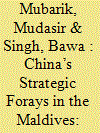

|
|
|
|
|
| Summary/Abstract |
However, in contemporary times, the South Asian region has been gaining tremendous significance in China’s foreign policy primacy, which aims to maintain and promote regional peace, stability and consequently, its peaceful rise. Also, as India began to look towards Eastward, China began to look towards Southward to counter the formers strategic maneuvers. Therefore, in this context, South Asia constitutes a vital region for China’s strategic ambit, and the Maldives is no exceptional in its foreign policy radar.
|
|
|
|
|
|
|
|
|
|
|
|
|
|
|
|
| 2 |
ID:
193198
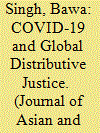

|
|
|
|
|
| Summary/Abstract |
The second wave of the COVID-19 pandemic had left heart-wrenching impacts on all facets of life in general and the availability, accessibility, and affordability of medicines and vaccines in particular. Rather, the world has been divided into two groups regarding access to medicine and vaccines as haves and have-nots. The rich countries had pre-ordered the vaccines of COVID-19 along with the holding of the same. The pandemic situation was further worsened, given the Trade-Related Intellectual Property Rights (TRIPS) in practice and restrictions on sharing technology of vaccines, medicines, and life-saving equipment. In this context, India and South Africa have proposed the joint proposal and garnered support for waiving off TRIPS to ensure equity, accessibility, and affordability of vaccines and the same as public goods. In this review, we emphasize that global justice is one of the important elements of normative international theories, which focus on all the moral obligations from the world’s rich to the world’s poor. The paper also questions and argues that if the rich countries fail to go by the principles of global justice, can the Indian and South African (SA) patent diplomacy play a catalyst role in global justice? The review concludes with an emphasis on global solidarity, and the acceptance of joint India–South Africa’s “patent diplomacy” for TRIPS waiver would result in mass production and fair distribution, making the COVID-19 medicines and technologies available to everyone regardless of their poor–rich status.
|
|
|
|
|
|
|
|
|
|
|
|
|
|
|
|
| 3 |
ID:
143052
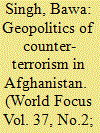

|
|
|
|
|
| Summary/Abstract |
Since its political independent existence 1747, Afghanistan had been useful for the great empires for sustaining the balance of power. The geopolitical rivalry between British India and Tsarist Russia from the last century (1880-1901) to date had complicated the security situation in Afghanistan. It was not the issue of sovereignty rather it was security concerns of British India and Russia that determined Afghanistan as a state.
|
|
|
|
|
|
|
|
|
|
|
|
|
|
|
|
| 4 |
ID:
189632
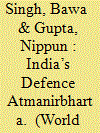

|
|
|
|
|
| Summary/Abstract |
The Indian defence sector has experienced considerable growth in recent years due to an increase in indigenous production and export promotions. Recently, India held a “Defense Expo” to showcase its Atmanirbharta in the defence sector. Indigenization in the defence sector would capitalise on India’s strategic autonomy principles in a world order in transition. This article seeks to analyse India’s defence production model in light of current changes such as private sector investments and innovations. In addition, the article will examine the challenges surrounding India’s self-reliance paradigm. The article will conclude by highlighting the indigenization priority areas applicable to India’s defence model.
|
|
|
|
|
|
|
|
|
|
|
|
|
|
|
|
| 5 |
ID:
186837
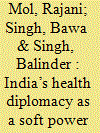

|
|
|
|
|
| Summary/Abstract |
India and Africa have been sharing a multidimensional relationship of cooperation and friendship since the ancient civilizations. The COVID-19 pandemic has brought new possibilities and opportunities for India to leverage its soft power diplomacy towards Africa. The paper’s main focus is to analyze how India has made soft power part of its foreign policy and examine India’s relationship with the African continent through health diplomacy. A literature search was done in major databases, such as Web of Science, Medicine/PubMed, Scopus, OVID, and Google Scholar search engine to gather relevant information. Through humanitarian assistance and geopolitical influence, India had won the support and heart of Africans. Besides, India has become a global healthcare provider in the African continent through its global health diplomacy and vaccine diplomacy. India has achieved impressive gains through its soft power diplomacy and has become a compassionate and benevolent actor in the African continent.
|
|
|
|
|
|
|
|
|
|
|
|
|
|
|
|
| 6 |
ID:
193027
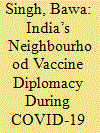

|
|
|
|
|
| Summary/Abstract |
In recent years, India has established itself as the world’s ‘pharmacy hub’, and this claim was proven once again when it delivered COVID-19 vaccines to its citizens, neighbouring nations and across the globe. Following the philosophy of humanitarianism through the principle of ‘Vasudhaiva Kutumbakam’, India has decided to provide the COVID-19 health assistance to its immediate neighbouring countries. India’s immediate neighbourhood refers to the countries that are geographically adjacent to it. In addition, India’s vaccine diplomacy has exposed geopolitical fault lines in South Asia as China’s vaccine diplomacy aims to outpace India in the region. Against this background, the main objective of this paper is to explain and examine India’s vaccine diplomacy as an instrument of its ‘Neighbourhood First’ policy during the COVID-19 pandemic. It argues that India’s health-focused approach has proved effective and aligned with its national interests. This review demonstrates that India’s health diplomacy has had an impact on medical and humanitarian assistance reciprocation at the regional and international levels. As a result of this strategy, during the second wave of the pandemic, India received medical devices and vaccines from other countries in dealing with COVID-19.
|
|
|
|
|
|
|
|
|
|
|
|
|
|
|
|
| 7 |
ID:
144015
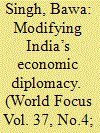

|
|
|
|
|
| Summary/Abstract |
Both the regions had historical and civilizational bonds and enjoyed good economic ties. But these economic ties had frozen on account of colonial dynamics for an extended period. With the breakup of Russia, the Central Asia has emerged on the geopolitical landscape. Since then, both India and Central Asia are having good political relations, but the economic ties including trade and investment are at the lowest level despite the launch of several policies. The Modi government took over the reins in 2014.
|
|
|
|
|
|
|
|
|
|
|
|
|
|
|
|
| 8 |
ID:
146745
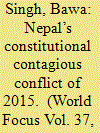

|
|
|
|
|
| Summary/Abstract |
Nepal has been undergoing a swift and unparalleled transformation in the political arena on account of factors like absence of unity among political parties, inadequate political participation for minority and ethnic people, economic weakness and vested interests of regional and external powers in the country's stability. Since 1950, Nepal has seen six constitutions and last one was promulgated on September 20, 2015 after the seven years grueling efforts of Constituent Assembly-1 and Constituent Assembly-II (2008-2015). The scholars, analysts, politicians of Nepal have been considering it as a very progressive and inclusive document. However, it has proved more contentious and controversial as the one-third Nepalese population (Madheshi people), who perceived it as discriminatory and exclusive one. It has created political paralysis in Nepal creating a lot of contagion effects of cold and cough for India as well.
|
|
|
|
|
|
|
|
|
|
|
|
|
|
|
|
| 9 |
ID:
183143
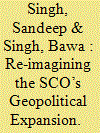

|
|
|
|
|
| Summary/Abstract |
The SCO is one of the biggest geopolitical groupings in the world. It has provided a forum for its members, particularly, Russia and China, to cooperate on the set goals of the Eurasian re-integration. In contrast, SAARC cannot be termed as a successful organization, given the arch–rivalries between India and Pakistan. However, optimists believe that the geopolitical expansion, having India and Pakistan on board, the SCO would have the potential for economic and strategic cooperation. On the other hand, the evolving Sino-Pak axis vis-à-vis India has generated a view that China has offered an SCO platform to make its South Asia Policy a reality. Hence, an attempt has been made to assess the evolving speculations; will the geopolitical expansion of SCO unfold new opportunities or merely make SCO as another SAARC?
|
|
|
|
|
|
|
|
|
|
|
|
|
|
|
|
| 10 |
ID:
193399
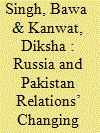

|
|
|
| 11 |
ID:
187573
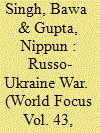

|
|
|
|
|
| Summary/Abstract |
Russia Ukraine War has created global reverberations. It has once again put West and Russia on a war footing. India being a
rising power in world politics owing to its economic growth to be the fifth largest economy in dollar terms and robust tax collections, its response to the conflict was keenly observed by both the blocs. It was steered by a neutral position keeping its
peoples intrest supreme, that West saw as a fence-sitting approach. India has balanced its relations with peaceful and diplomatic solutions.
|
|
|
|
|
|
|
|
|
|
|
|
|
|
|
|
| 12 |
ID:
153129
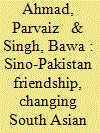

|
|
|
|
|
| Summary/Abstract |
In the context of changing global geopolitics, South Asia as a global pivot amongst major regions and powers has recently acquired a more central geostrategic position. China and Pakistan have long been sharing strong political, cultural and economic relations and are portrayed as all-weather friends, amplifying their engagement to secure their respective specific interests within and outside the region. This Sino-Pakistan link has been treating India as a collective target, with China acting contrary to India’s interests also in light of rising Indo-US strategic leverage. Against this complex backdrop, which also implicates Central Asia, the ultimate focus of this article is to locate India’s geostrategic interests and future prospects in view of the strong Sino-Pak friendship. Our key findings suggest that in this new ‘Great Game’, Indo-US links are going to become even more crucial, but that India should not just wait for US decisions.
|
|
|
|
|
|
|
|
|
|
|
|
|
|
|
|
|
|
|
|
|